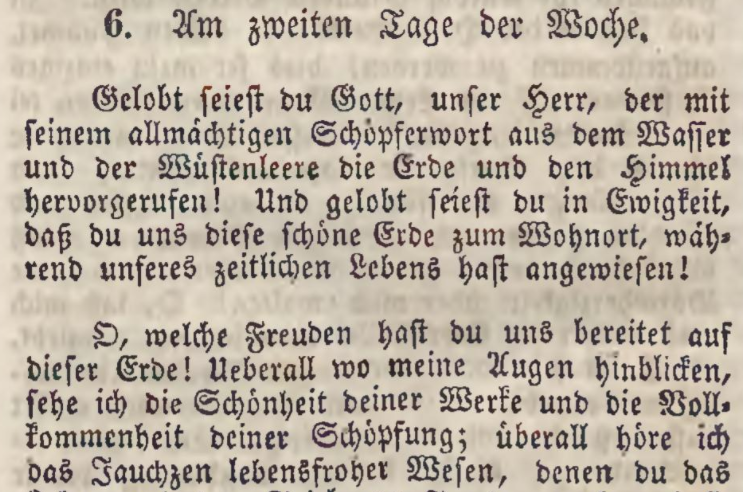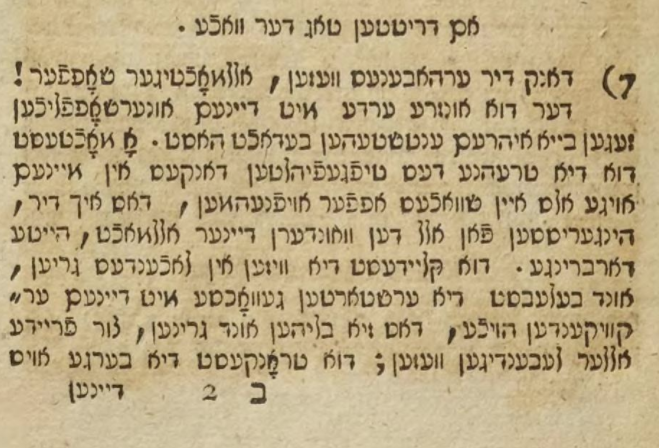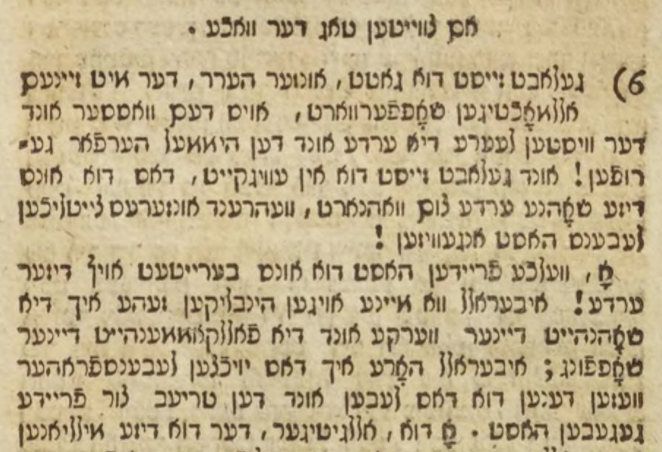| Source (German) | Translation (English) |
|---|---|
Am fünften Tag der Woche. |
On the fifth day of the week. |
Dank dir, Herr der Welt, der du diese schöne Erde mit Geschöpfen angefüllt hast, daß sie sich deiner unendlichen Güte freuen. Als du den großen Erdball mit allen den Schönheiten ausgeschmückt hattest, in welchen wir ihn heute erblicken, da fand deine göttliche Weisheit, daß diese über alles schöne und erhabene Schöpfung ein todtes Reich, eine schauerliche Wüste sein würde, wenn nicht Wesen auf ihr lebten, los gebunden von der Erde, die sich ihrer freuen. |
Thank you, Lord of the world, who has filled this beautiful earth with creatures that they may rejoice in your infinite goodness. When you had adorned the great globe with all the loveliness in which we see it today, your divine wisdom found that this creation, beautiful and sublime above all, would be a dead realm, a ghastly waste, if creatures did not live on it, unbound from the earth, rejoicing in it. |
Und du schufst durch deinen allmächtigen Willen Wesen aller Art. Was sich im Wasser regt, was auf der Erde wandelt, was im Staube kriecht oder in den Lüften schwebt; das große Ungeheuer im Meere und der kleinste Wurm, der in einem Wassertropfen mit tausenden seines gleichen, sich des Daseins freut, sie alle sind Werke deiner Allmacht, sie alle verkünden deine Größe, sie alle loben und preisen dich; alle vereinigen sich zu dem großen Hallelujah der Schöpfung; alle hoffen auf dich, daß du ihnen Nahrung giebst zur rechten Zeit, denn du öffnest deine milde Hand, und sättigest alles was lebt, mit Wohlgefallen. So du aber dein Antlitz verbergest, schwinden deine Geschöpfe dahin; nimmst du ihnen den Hauch des Lebens, so verscheiden sie und kehren in ihren Staub zurück; du läßt deinen Hauch über sie wehen, und sie erstehen ungeschaffen; so erneust du stets die Oberfläche der Erde. |
And you created beings of all kinds by your almighty will. What stirs in the water, what walks on the earth, what creeps in the dust or floats in the air; the great monster in the sea and the smallest worm, which in a drop of water with thousands of its kind rejoices in existence, they are all works of your omnipotence, they all proclaim your greatness, they all praise and extol you; all unite in the great hallelujah of creation; all hope in you that you will give them food in due season, for you open your bountiful hand, and satisfy all that live. But if you hide your face, your creatures fade away; if you take away the breath of life from them, they pass away and return to their dust; you let your breath blow over them, and they arise uncreated; thus you always renew the surface of the earth. |
O, Allmächtiger, der du diese Millionen alle speisest mit deiner ewigen Güte! gieb mir und den Meinigen unsere Lebensbedürfnisse ohne drückenden Kummer, auf daß wir dich mit heiterem Gemüthe preisen können. Dann will ich dir, o Ewiger, lobsingen mein ganzes Leben lang, meinen Gott lobpreisen so lange ich da bin. Es freuen sich, die auf dich hoffen, nie hast du die verlassen, die dich suchen. Amen. |
O Almighty, who feeds all these millions with your everlasting goodness, grant me and mine our necessities of life without oppressive sorrow, that we may praise you with serene minds. Then I will sing praises to you, O Eternal One, all my life long, praise my God as long as I am here. Rejoice those who hope in you, never have you forsaken those who seek you. Amen. |
“Am fünften Tag der Woche” was included by Yehoshua Heshil Miro in his anthology of teḥinot, בית יעקב (Beit Yaaqov) Allgemeines Gebetbuch für gebildete Frauen mosaischer Religion. It first appears in the 1829 edition, תחנות Teḥinot ein Gebetbuch für gebildete Frauenzimmer mosaischer Religion as teḥinah №9 on pp. 12-13. In the 1835 and 1842 editions, it also appears as teḥinah №9 on pp. 13-15. In a note to “Gebet am Tage der Gedächtnißfeier verstorbener Eltern, an deren Grabe zu sprechen” published in the 1835 edition, Miro records that Isaak Plessner sent this prayer to him, and from this we infer that its authorship may also be attributed to him.
We welcome corrections and improvements. The transcription of the German from Latin script in Fraktur type provided machine-readable text for a machine translation by DeepL, which we then edited for accuracy and clarity. –Aharon Varady
Source(s)



“Am fünften Tag der Woche | On the fifth day of the week, a teḥinah by Isaak Pleßner (1829)” is shared through the Open Siddur Project with a Creative Commons Attribution-ShareAlike 4.0 International copyleft license.







Comments, Corrections, and Queries